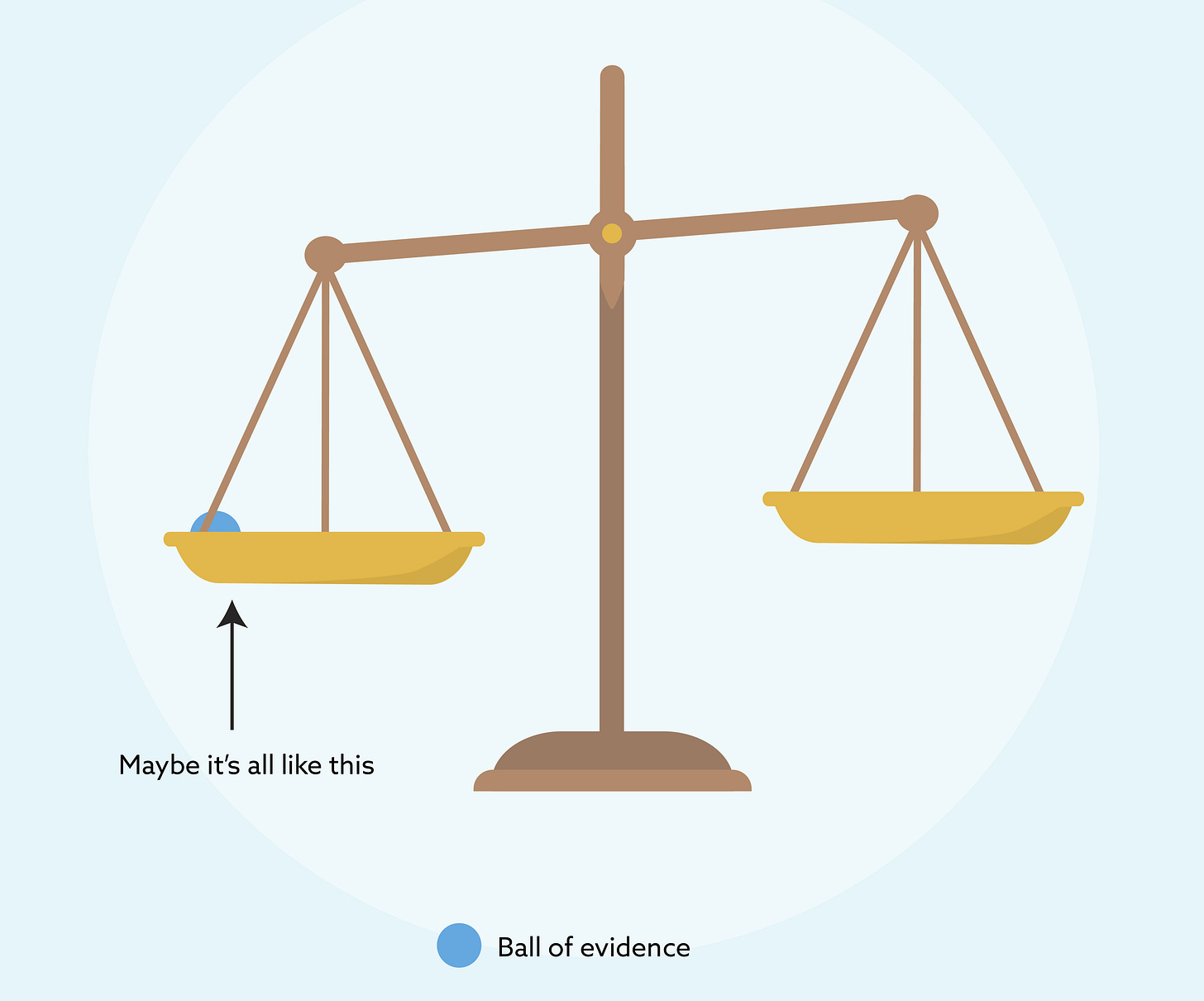Why Negative People Are So Draining
Move Over, Atomic Habits: Make Way for Quantum Leaps
How do we decide what’s good or bad? How do we judge things? First, a metaphor for how we collect information:
The Balancing Scales Metaphor for Learning
Stage 1: Even!
At this stage, we have no information or biases whatsoever on a topic. Our minds are clear, unscathed. This stage probably lasts for about the first 5 seconds after birth.
Stage 2: Developing Impressions
Whenever we pick up a piece of information, it goes onto one side of the scale (good/bad, yes/no), and we start learning. If you see a photo of someone attractive, you’ll start developing a positive impression.
Things are happening! Because social information is real information, the opinions of our parents, peers, and the media when we’re young leave lifelong footprints on our understanding of the world. Lifelong. In short: our brain is weighing the pros and cons, adding things to the scale to come to a final tally.
Stage Three: But wait, there’s more!
Maybe at first we saw a cute guy, but then we learn that he’s a murderer! Yikes! That’s a big marble on the other side of the scale.
This goes on and on, back and forth, until the scale starts tipping:
Stage Four: I Have a Hunch
At some point, we cross that threshold and get a hunch. We’ve developed an implicit association or gut feeling, the kind of automatic mental connection that Malcolm Gladwell wrote about in Blink; even if we can’t articulate it, we’ve decided. It’s at this point where our brain and attention start to engage in a cognitive sleight of hand: we start paying attention to information that confirms our beliefs. We interpret ambiguous or neutral information in a way that backs us up. We ignore or dismiss things that don’t line up with our narrative.
We all engage in confirmation bias: we come to a conclusion and then interpret the information in a way that proves ourselves right. Unless you are the person ahead of me at a deli, you cannot keep pondering options forever: eventually, we have to decide and move on with our lives. (Isn’t it funny how we all feel immune from this process? It’s easy to see how other people jump to conclusions or fail to hear sound reasoning, but we’re all harbingers of the truth.)
Everyone engages in confirmation bias, all the time—especially when it comes to the beliefs we have about ourselves.
The Case for Making Big Changes requires us to first accept the fact that we engage in confirmation bias about ourselves and our beliefs about the world.
When I was drinking and smoking and not taking care of myself, my scale was replete with “I am a piece of crap” marbles. I wasn’t paying attention to the effects of my self-destructive behaviors. I thought bad shit always happens to me, not maybe I shouldn’t be such a depressed and defensive bitch and my behaviors have consequences.
I also didn’t notice these self-defeating behaviors because so many people in my social environment had them, too: my family. The Atomic Habits trick of “one small thing each day” didn’t work for me because I needed, fundamentally, to feel better about myself and be more optimistic about the world. We start picking up these marbles at birth—so we have no idea how much our family has calibrated our scale and worldview.
Emotions Are Contagious
Ladies and gentlemen: I am in a funk. I am surrounding myself with comedy podcasts. I have joined a gym. And, as such, I am taking a pause from the negative people in my life: my family. It’s not easy.
What we pay attention to, and how we interpret it, is ultimately what affects the quality of our daily experiences. Attention is our brain’s one true limitation. Happiness doesn't depend on how good or perfect things are. The biggest influence on our happiness is our attention and how we interpret information.
The best way to predict someone’s future is to look at their beliefs about the world, how they make sense of new information, and how well they incorporate this into their lives.
In short, you want to look at what marbles they keep adding to the scale.
Sometimes, you need to take a break from people who consistently see the negative in everything. Angry people. Sometimes, you need a pause from tiptoeing around someone’s untreated depression while trying to treat your own depression. It’s nothing to feel ashamed about.
Studying When You Stumble
“The only way to understand a mechanism such as the eye, [Kahneman] thought, was by studying the mistakes that it made. Error wasn’t merely instructive; it was the key that might unlock the deep nature of the mechanism. “How do you understand memory?” he asked. “You don’t study memory. You study forgetting.”
- Michael Lewis, The Undoing Project
I’ve decided to make these big changes because I’ve been paying attention to my slips. If you’re trying to make a big change, instead of trying to make the new behavior more tempting, pay attention to what happens when you stumble. Especially when it comes to ourselves and our beliefs about the world. And who’s around.
From “This Be The Verse,” by Philip Larkin:
They fuck you up, your mum and dad.
They may not mean to, but they do.
They fill you with the faults they had
And add some extra, just for you.
Don’t be shy! I value feedback and love connecting with readers! hello@kstarr.com.
Thanks for reading! If you liked this, you can sign up for a Medium account, subscribe to my newsletter, or forward it to someone who’d like it. I’m also on Twitter, Instagram, and LinkedIn. Article may contain affiliate links.







